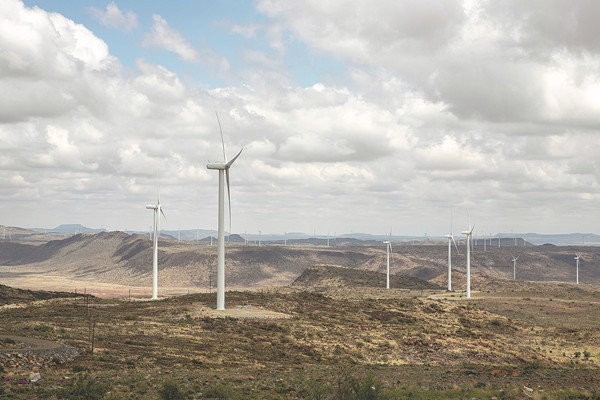
A view of a wind farm under the De Aar wind power project in Northern Cape, South Africa, in November 2021. [Photo/Xinhua]
The largest wind power project in South Africa, built by China Energy Investment Corp, has eased the energy shortage in the country — a major bottleneck delaying the continent's industrialization. It has also facilitated South Africa's low-carbon transition, analysts said.
The De Aar wind power project — the first wind power project financed, constructed and operated by a Chinese company in Africa — has provided 760 million kilowatt-hours of clean power each year since it went into operation in 2017. That is equivalent to power provided by 215,800 metric tons of standard coal, according to its operator, China Longyuan Power Group Corp Ltd, a subsidiary of CEIC.
It will not only meet the power needs of more than 300,000 households, but also optimize the local energy structure while further facilitating the green and low-carbon transition in South Africa, which has been plagued by frequent blackouts, it said.
Since Oct 31, 2017, when it started operating commercially, the wind farm has generated over 2 billion kWh, according to the CEIC.
Developing clean energy and building a modern energy system are both significantly important for Africa, said Wei Hanyang, a power market analyst at BloombergNEF.
China has been a staunch supporter and important partner of Africa on the path of green development, Wei said, adding that both China and African nations have made new energy and green development a focus of their cooperation in recent years.
"Energy development has long been a focus of the cooperation between China and Africa, while renewables play an increasingly key role in new investments," he said.
While construction costs remain high, it is anticipated that more State-owned and private investors will go to the African continent once the tariff model for renewables is settled, he said.
China has implemented over 100 clean energy and green development projects under the framework of the Forum on China-Africa Cooperation, said the National Development and Reform Commission, China's top economic regulator. These projects have significantly contributed to the sustainable development of Africa, officials said.
There is no doubt that clean energy is a new area of common interest and growth for China-Africa cooperation, said Luo Zuoxian, head of intelligence and research at the Sinopec Economics and Development Research Institute.
As the Belt and Road Initiative goes deeper and the FOCAC continues to show its potential, China and Africa will continue expanding their clean energy cooperation, innovating in models of working together and enriching those models in order to realize the vision of a green Africa, Luo said.